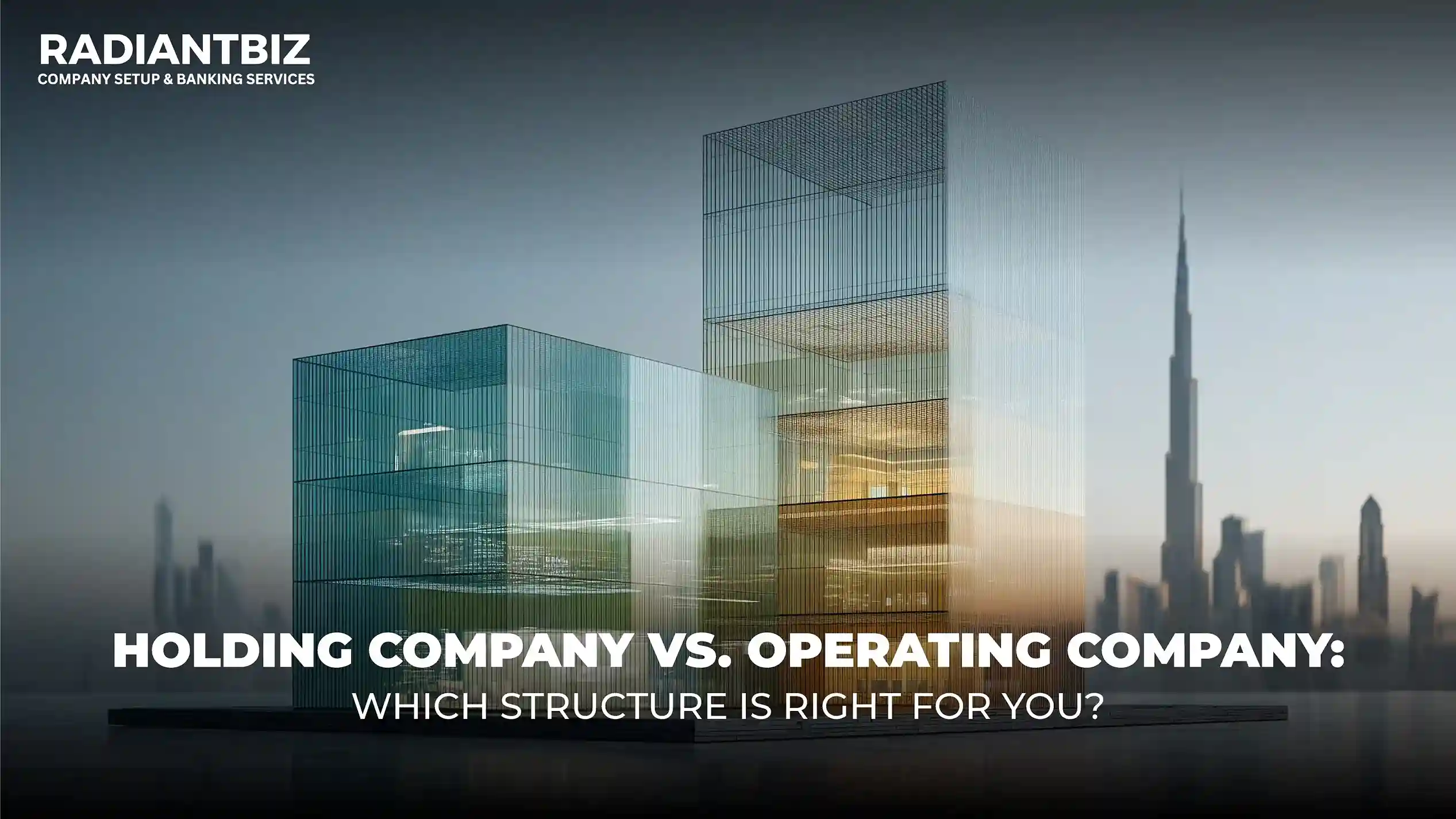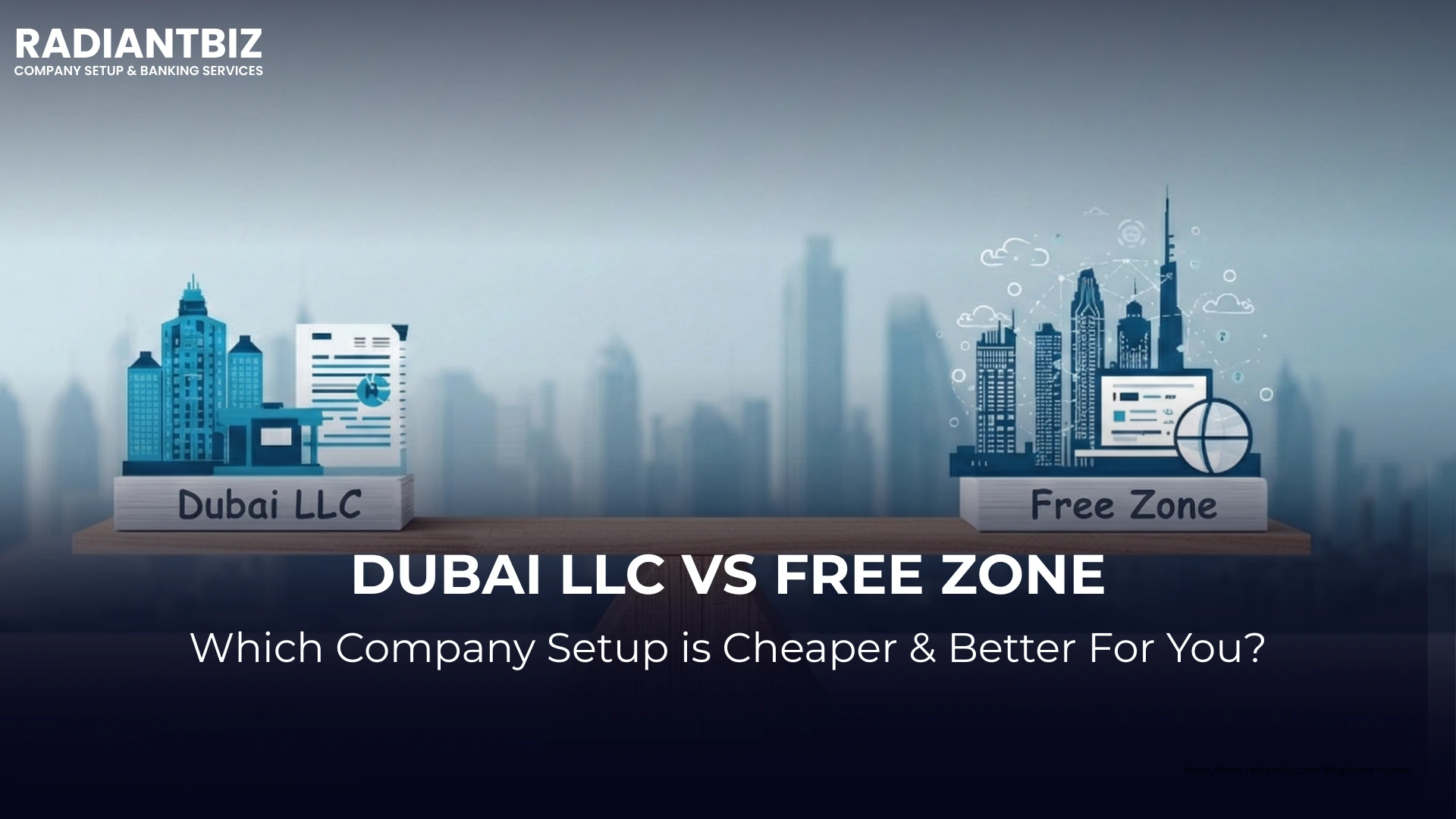Holding Company vs. Operating Company: Which Structure is Right for You?


Table of Contents
Selecting the correct business structure is not just a technicality, it can decide how your assets are safeguarded, how your company grows, how you're taxed, and how you save for the future. As businesses become more international and complicated in 2025, numerous entrepreneurs and investors are considering two main structures: the holding company and the operating company models.
But what exactly do they mean? And more importantly, how do you know which one is best for you? This article takes a deep dive into the particulars.
What Exactly is a Holding Company?
It is an organization whose sole purpose is to own other companies. It does not usually create goods or services, nor does it interact directly with customers. Rather, its main function is to hold shares, whether in the form of shares or intellectual property (IP), of the subsidiary firms.
Essentially, it is an umbrella that covers multiple businesses or investments. The holding company makes money through dividends, rent from property, or capital appreciation, but often does not have operating activities itself.
What are the Typical Functions of a Holding Company?
- Owns stock in one or more corporations
- Maintains valuable assets (real estate, patents, trademarks)
- Consolidates management and decision-making
- Reduces risk by keeping operations separate from ownership
Here are Some Examples of Holding Companies:
Alphabet Inc. Owns: Google, YouTube, and other ventures.
Berkshire Hathaway (Warren Buffett's Holding Company) Owns: Geico, Dairy Queen, and other ventures.
Numerous family offices and investment houses are also holding companies.
What Actually is an Operating Company?
It is a company that usually deals with consumers. It handles the day-to-day operations, everything from production to sales, customer support to recruiting employees. It holds ownership of the operational infrastructure and addresses real-world risks such as contracts, competition, and changes in the market.
Operating companies are where the action takes place. This is where products get made, services are rendered, and income is directly earned.
What are the Key Functions of an Operating Company?
- Runs the core business activities
- Oversees employees, suppliers, and customers
- Pays operational taxes
- Bears operational risks (such as lawsuits, regulatory issues)
Examples include restaurants, tech startups, retail stores, consulting firms, or even logistics companies.
How Do Holding and Operating Companies Compare?
Here’s a quick look at the differences between the two:

What are the Pros and Cons of Each Structure?
Holding Company:
Pros:
Risk management: Your valuable assets (such as IP or property) are shielded from operational risks.
Centralized control: Best for running a portfolio of companies under one umbrella.
Tax optimization: Much simpler to arrange for tax optimization, particularly in jurisdictions with beneficial regulations.
Flexible exit: You can dispose of operating companies without losing the core company.
Succession planning: Simplifies passing on the ownership to heirs or partners.
Cons:
More complex: Involves legal and tax planning, particularly between jurisdictions.
Higher setup and maintenance costs: Particularly when handling multiple subsidiaries.
Not revenue-generating by itself: It depends on its subsidiaries to perform.
Operating Company:
Pros:
Simplicity: Easy to set up, manage, and scale in one business area.
Direct profit generation: You’re in control of operations and revenue streams.
Clear branding and identity: Customers interact directly with your brand.
Cons:
All-in-one risk: Assets and operations are in the same basket, increasing vulnerability.
Less flexibility: Expansion, exit strategies, or succession may become more complicated.
Limited scope for tax planning: Particularly in nations with intricate corporate tax legislation.
When Does a Holding Company Make the Most Sense?
Holding companies are best suited in the following scenarios:
- You have several businesses: If you have a chain of restaurants, an online brand, and a software firm, a holding structure can provide you with improved control and protection.
- You need to shelter your assets: Take the case of real estate investors who keep properties in a special entity, keeping them legally separated from tenants or legal suits.
- You want to plan for the future: Want to leave business for your children or sell a portion to investors? A holding structure facilitates it easily.
- You're planning international growth: A holding company in a tax-efficient jurisdiction (such as the UAE or BVI) can provide cross-border tax efficiency and simpler global compliance.
When Does an Operating Company Make the Most Sense?
An operating company can be the best option when:
- You're launching something new: If you're introducing a new product or service, it is simpler and less expensive to utilize an operating company.
- You have one market: Local operations with no subsidiaries may not require a more intricate structure.
- You must act quickly: Operating companies make it possible to make decisions more quickly and be agile on a day-to-day basis.
Can You Use Both?
Yes, and many successful companies do through using the HoldCo-OpCo structure.
What is a HoldCo-OpCo Structure?
The HoldCo owns the OpCo in this structure. The HoldCo might also hold assets such as intellectual property, real estate, and trademarks. It licenses or leases them out to the OpCo.
Why would you do this?
Legal separation: If the OpCo is sued or declares bankruptcy, the HoldCo's assets are protected.
Tax advantages: IP or asset holding in a jurisdiction with lower taxes can minimize total tax burden.
Investment and funding: You may sell shares in OpCo or issue funds without laying hands on the parent company.
Here’s an Example:
A start-up tech company can create an app (OpCo) and keep its software code and trademarks under the parent HoldCo. If the OpCo is later sold or merged, the parent still owns the intellectual property.
What Legal and Tax Issues Should You Address First?
- Which jurisdiction should I incorporate in?
Certain jurisdictions (such as the UAE, Singapore, BVI) are more suitable for holding companies because of tax treaties and beneficial laws.
- How will dividends and royalties be taxed?
Know how intra-group transactions are dealt with legally and from a tax viewpoint.
- Am I ready for compliance and reporting?
Holding structures can bring more scrutiny from tax authorities if they are not well-designed. This is where seeking professional guidance from a corporate services or law firm is necessary.
Still in Doubt? Ask Yourself These Key Questions
- Do I intend to diversify into several businesses or geographies?
- How high is my current operation's legal risk?
- Do I have valuable assets such as IP or property that I must safeguard?
- Is succession planning or long-term wealth management part of my objective?
- Do I have budget or time to handle two instead of one?
Your responses will guide your decision.
Let's Look at Some Examples
A. Tech Startup Growing Up
Originally launched as an OpCo to handle product development and user acquisition. Once traction was established, founders established a HoldCo to own the IP and look ahead to international fundraising.
B. Real Estate Investor with More than One Property
Every property is held in a distinct OpCo, with the parent HoldCo retaining responsibility for financing, branding, and leases so that a legal problem with one asset will not put the whole portfolio at risk.
C. Investor with Equity in Multiple Startups
A holding company combines ownership interests into one entity, simplifying tax reporting, raising capital, or exiting investments.
How Do You Set Up a Holding or an Operating Company?
Steps for a Holding Company:
- Select a jurisdiction (UAE, BVI, Singapore, etc.)
- Secure the company license and create shareholder agreements
- Open a business bank account
- Transfer ownership of existing assets or businesses
Steps for an Operating Company:
- Select your legal structure (LLC, Sole Proprietorship, etc.)
- Secure required trade licenses and permits
- Open up a business account and establish your operations
- Remain compliant with local tax and labor laws
What Mistakes Should You Avoid No Matter What?
- Blurring of personal and business assets into one entity
- Creating a complex structure without a clear reason
- Failing to plan for taxes across multiple countries
- Not documenting inter-company transactions properly
- Waiting too long to set up a holding structure after scaling up
Which One is Right for You?
There is no one-size-fits-all answer. If you’re starting small, working locally, and want to keep things lean, an operating company could be perfect.
If you're expanding quickly, own valuable assets, or need to shield your interests in more than one business, a holding company's a good idea.
For most companies, having the best of both worlds is the perfect setup, availing control, flexibility, and protection.
Next Steps: Ready to Make Your Move?
Before you act, think about:
Meeting with a business advisor or setup consultant
Comparing jurisdictions by your type of business and objectives
Planning for the future, not just the present
Your structure today could define your opportunities tomorrow.
Seek our professional on-the-ground guidance, contact us via mail at info@radiantbiz.com or WhatsApp & call us at +971521322895!



2.png)




.avif)